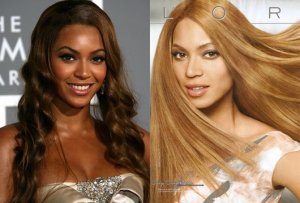Skin bleaching / lightening is the act of using artificial products to reduce the melanin content in ones skin causing their pigment to fade and thus, they become lighter. This procedure has been supported and promoted by some Jamaican Dancehall artists who undoubtedly have a lot of influence on the upcoming generations, hence, influencing their perception of acceptable skin colour as it relates to social class and social mobility. Within these lightening/ bleaching products there are chemicals such as hydroquinone that cause various internal cancers due to absorption of carcinogens. Skin Bleachers therefore run the risk of developing cancer or other ailments from using these harmful products. (Huffington Post) Within the music promoting the use of skin lightening products, there is little or no information about the harmful effects of these products, maybe because the Artist are probably unaware of it, or they just do not seem to care. Huffington Post’s article highlighted some of the health problems associated with skin bleaching, and how local Jamaican artist are somewhat responsible for the publication and acceptance of skin bleaching. They, however, do not account for the large amounts of information being divulged by Western Social Media groups, which ultimately contributes to the shaping of beliefs about body image as to what is to be desirable and what is not to be.
The Gleaner’s article on Skin bleaching goes further into explaining the social causes or influences that one way or another, contributes to Skin Bleaching:
“Petra Alaine Robinson (2011), in Skin Bleaching in Jamaica: A Colonial Legacy, argues that, although the desire for lighter skin colour is a global issue, it is of particular relevance and significance in Jamaica because “the majority of the population is of African descent, yet there is an elevation of Eurocentric values and a denigration of Afro centric values in many facets of life, specifically in the promotion of light skin as an indicator of beauty and social status”. (The Gleaner, 2013.)
The Gleaner explained that, Skin bleaching is a result of normalised social conditioning that ‘anyting black nuh gud,’ hence the desire to bleach’. Also the Gleaner made reference to Vybz Kartel who wrote a compelling chapter about ‘the black child’ in his book, The Voice of the Jamaican Ghetto, to this effect. The pervasiveness of associating importance and privileges with one’s colour in independent Jamaica perpetuate the practice of skin bleaching. Society perpetuates the injustice of colour discrimination through culture and music, in our churches and schools, government and private-sector entities, and the very sentiments we express daily. “This may be seen as signs of internalized racism, the message that black/dark skin complexion is appalling on the psychological and broader mental health of black populations, especially youth, who are very impressionable.” (Dancehall Reggae World.)
The ‘fashion’ or trend of skin bleaching that occurs not only in Jamaica but in a less pronounced ways in other countries, outside of the Caribbean, is concerning. There is theoretical and empirical research that has demonstrated that social norms are capable of influencing health and behaviour trends on a global level. (Huffington Post, 2013.) Media has influence on society’s perception of beauty, which unfortunately leans more towards the Eurocentric ideals of beauty. Within the Caribbean there has been a consistent influx of foreign popular media such as television shows, music, movies and magazines. Within these forms of media there is the portrayal of dominant ideologies that contribute to what is perceived as beautiful and what is associated with social status and elitism. There is also the importation of many foreign products whose advertising perpetuate those same ideologies.. Western advertising is infamously known for “photo- shopping” celebrity images to allude to the idea of perfection with regards to body size, facial features and hair enhancements. The trend or desire of having a thinner body image is one that has been increasingly held up as ideal for women and can be traced back to World War II. (Teen Health and Media.) This Western/ European ‘ideal type,’ sadly, excludes most of the female body types present in the Global south, due to difference in lifestyles, social class and dietary provisions. It may be taken for granted just how widely the media’s influence reaches. Beauty and the concern with ones appearance may have traditionally been associated with being feminine, however, in Jamaica and much of the Caribbean it is seen that the need to identify with the ideal type does not discriminate and that both men and women fall prey to this desire, in this case with respect to their complexion.
Studies in relation to media and body image have found:
“In a survey of girls 9 and 10 years old, 40% have tried to lose weight, according to an ongoing study funded by the National Heart, Lung and Blood Institute.” (Mirror Mirror)
“In a study on fifth graders, 10 year old girls and boys told researchers they were dissatisfied with their own bodies after watching a music video by Britney Spears or a clip from the TV show “Friends”. (Mirror Mirror)
“A Kaiser Foundation study by Nancy Signorielli found that; in movies, particularly, but also in television shows and the accompanying commercials, women’s and girls’ appearance is frequently commented on: 58 percent of female characters in movies had comments made about their looks, as did 28 percent in television shows and 26 percent of the female models in the accompanying commercials. Mens’ and boys’ appearance is talked about significantly less often in all three media: a quarter (24%) of male characters in the movies, and 10 percent and 7 percent, respectively, in television shows and commercials. One in every three (37%) articles in leading teen girl magazines also included a focus on appearance, and most of the advertisements (50%) used an appeal to beauty to sell their products.” (Mirror Mirror)
In retrospect, Skin bleaching is a serious matter not only affecting ones health but also their social status, perception and by extension their beliefs about who they are as an individual. Skin colour is given much preference in today’s society and because of this individuals are dissatisfied with their skin colour and choose to modify their image. They aim to become someone or something that society would more likely accept as opposed to embracing their true nature and skin colour.
– littleusgoneglobal?
-Andy Bristol
-Leah Elbourne
References
Duncan, Dustin. “Dancehall Music and Skin Bleaching: Destructive Fashion or Internal Foe?” The Huffington Post. June 3, 2013. Accessed March 15, 2015. http://www.huffingtonpost.com/dustin-t-duncan/dancehall-music-and-skin_b_2818690.html.
Nelson, Jaevion. “Bleaching Their Way to Acceptance.” Bleaching Their Way to Acceptance. June 27, 2013. Accessed March 15, 2015. http://jamaica-gleaner.com/gleaner/20130627/cleisure/cleisure4.html
Smith, Alonzo. “Dancehall Music and Skin Bleaching: Destructive Fashion or Internal Foe?” Dancehall Music and Skin Bleaching: Destructive Fashion or Internal Foe? Accessed March 15, 2015. http://www.dancehallreggaeworld.com/dancehall-music-and-skin-bleaching-destructive-fashion-or-internal-foe.html.
“Teen Health and the Media.” Teen Health and the Media. Accessed March 15, 2015. http://depts.washington.edu/thmedia/view.cgi?section=bodyimage&page=fastfacts
“The Media And Body Image.” Mirror Mirror. Accessed March 15, 2015. http://www.mirror-mirror.org/the-media-and-body-image.htm.
Photo credit:
http://fashionbombdaily.com/2011/01/21/beauty-discussion-is-using-skin-bleaching-creams-ever-ok/
http://urbanislandz.com/2014/11/19/alkaline-bleaching-before-and-after-photo-goes-viral/
http://www.beautyredefined.net/photoshop-phoniness-hall-of-shame/



I think apart from people bleaching their skin to adapt a fair or “white” look, they also do so because of low self esteem and lack of self- confidence. Many people, women in particular believe that whitening their skin will attract an intimate partner or spouse. In Nigeria, 77% of women use skin lightening products which is the highest in the world!
LikeLike
Yes, I absolutely agree with the point of self esteem contributing to the need/ desire to bleach! What we aimed to outline in this article is that there are underlying and unconscious principles and values that we hold within ourselves. These unconscious principles and values of beauty often align with the Western “ideal type.” Your contribution falls nicely into the agruement that; the “ideal type” (portrayed by the dominant media channels/ ad campaigns etc) can unconsciously contribute to the low self esteem that persons who bleach experience. The individual may be experiencing a internal conflict of seeing themselves as either being beautiful but still not embodying the “ideal type” (so they bleach because they are not happy with their own beauty) or seeing themselves as being ‘ugly’ because they are not physically representative of that same “ideal type”. (so they bleach to attempt to achieve that beauty)
-Leah 🙂
LikeLike